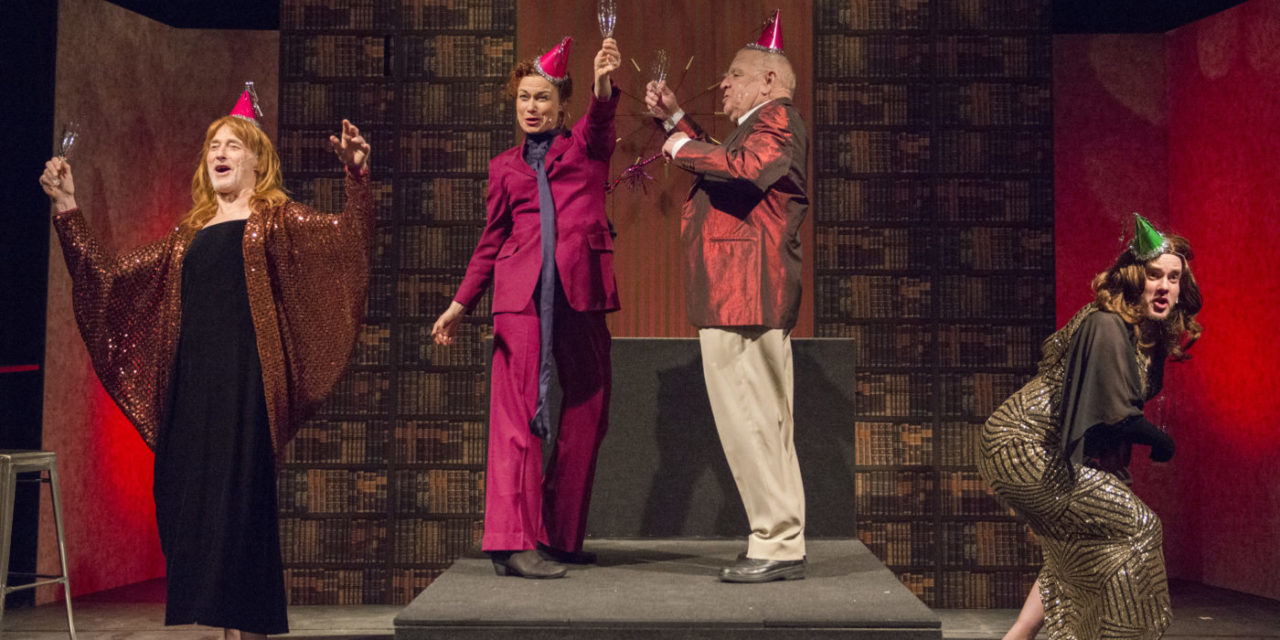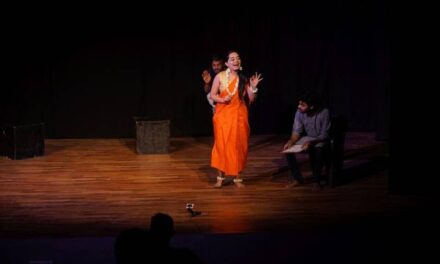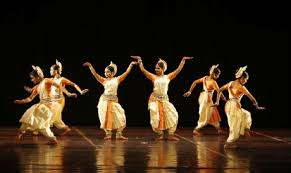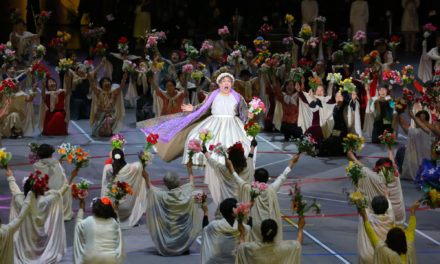Yet more adaptations, strong Danish voices, golden oldies, the music accompanying most productions, and an abundance of contemporary theatre. I SCENE takes a look at what’s on in the spring of 2018, identifying current trends.
2017 is behind us, and it’s time to see what we can expect in the spring of 2018 on Danish stages. 2017 was a year full of adaptations, where other genres were adapted to dramatic art for the stage, but also of politically fuelled theatre, with current themes and some consistently well-produced takes on classical plays.
Adaptations Yet Again
In the autumn of 2017, we had a flow of adaptations, where, in particular, popular film and television series were adapted into plays.
This trend continues, although in the coming spring we will encounter an even broader spectrum of genres on the stages around the country. The inspiration from motion pictures is less predominant, but of course, we will not be denied the second part of the Norwegian multi-media production SKAM at the Aveny-T theatre in Copenhagen.
It will be exciting to see whether the theatre can maintain the pace and live up to the success that the first part of SKAM had with at least younger audiences in the autumn of 2017.
The Royal Danish Theatre has also jumped on the bandwagon and in April will dive into Danish film director Lars Von Trier’s phantom comedy and the TV show titled Riget, known in English as The Kingdom. The title refers to the well-known Copenhagen hospital Riget, where the drama unfolds.
In the more peculiar part of this year’s adaptations, we will encounter also at the Royal Danish Theatre a dramatization of psychology professor Svend Brinkmann’s bestseller Stå Fast, known in English as Stand Firm: Resisting The Self-Improvement Craze, which teaches us to stop checking in with ourselves and instead be naysayers. We will see whether Brinkmann’s anti-self-help book has theatrical potential.
Most of this coming spring’s adaptations are of the good old kind, as in novels. The Royal Danish Theatre has picked a classic from the mainstream shelf in choosing Danish author Klaus Rifbjerg’s Den Kroniske Uskyld (a literal translation could be The Chronic Innocence).
The timeless coming-of-age novel may perhaps stand for a better dramatic delivery with actor Simon Bennbjerg in the lead as Janus as opposed to Edward Fleming’s somewhat strained staging of the screen version back in 1985.
The Betty Nansen Theatre has from the rather smaller literary library chosen Danish author Peer Hultberg’s monstrous and monumental Requiem, where 537 individual voices are interwoven into a chant on caused harm and hurt.
Requiem is directed by Jacob F. Schokking, who last season delivered the TV series DEKALOG into an intense scenic narration of images. At his disposal for the production of Requiem, Schokking has the stellar cast Lise Baastrup, Marie Bach Hansen, Elliott Crosset Hove, Solbjørg Højfeldt, Andreas Jebro, Olaf Johannessen, Steen Stig Lommer, and Julie Agnete Vang, so it would seem that we have a strong experience in store for us at Frederiksberg Allé.
The soliloquy Underkastelse (known in English as Submission), based on the author Michel Houellebecq’s provocative novel from 2015 about a Europe which submits freely to Islam, will be performed later this year at the same theatre. Actor Lars Brygmann will be on his own on stage as the professor of literature François, who some years into the future foresees the collapse of the Western world as we know it.
Houellebecq tends to be a source of disagreement, but the language used will certainly be outstanding, which should lead to a good soliloquy text.
There will also be a different theatre experience in store for us in the Copenhagen-based Teater Republique’s and the Jutland-based Aarhus Theatre’s co-production of Niels Henning Falk Jensby’s award-winning novel Techno. The production will be performed at a gay bar under the same name in Aarhus; however, in Copenhagen, it will be titled Frådseri (a literal translation could be Gluttony) and is part of Teater Republique’s series on the seven deadly sins.
There are many more adaptations of novels, comics, and fairytales out and about on the stages, but this spring they will have a worthy opponent in all the brand-new Danish playwriting.
Danish Voices
Playwrights such as Line Mørkeby, Andreas Garfield, Julie Petrine Glargaard, Jakob Weis, and Julie Maj Jakobsen have firmly established themselves as contemporary dramatic voices, but fortunately especially the smaller venues and theatres in the regions away from Copenhagen often offer opportunities for upcoming playwrights to showcase themselves.
Also, Teater Grob on Nørrebro in Copenhagen nearly every year presents us with new Danish playwriting, which this year will happen in April. Teater Grob will present Magnus Juel Berg’s play about war titled I Støvet Fra Regnen (a literal translation could be In The Dust From The Rain), in which actors Paw Henriksen and Janus Nabil Bakrawi will play two war veterans attempting to return to everyday life.
Berg graduated in 2015 from the Danish Playwriting School based at Aarhus Theatre together with Jeanette Munzert, who also has an upcoming play in production at the theatre Svalegangen in Aarhus. Her comedy about living in a commune, Grab Them By The Pussy, takes place in a tower block, where a group of residents is challenged in the name of feminism.
Another group of residents is challenged in Julie Maj Jakobsen’s play Marienborg – No Thank You, produced by the Copenhagen-based Sydhavn Theatre and to be performed at the theatre Sorte Hest on Vesterbro in Copenhagen.
In the play, a young female from a privileged background is challenged by a set of norms from a not so distant past when she moves into the block of flats where the former Danish prime minister Anker Jørgensen used to live.
Playwright Julie Petrine Glargaard takes us farther from home, using the cycling race Tour de France to shed some light on existential moments of meaningless.
Her play Hårnålesvinget (a literal translation could be The Hairpin Turn) is co-produced by two Jutland-based theatres–Vendsyssel Theatre and Team Theatre–and will be performed in both venues.
Jakob Weis remains in Denmark, but looks back in time and on the collaboration between two Danes–the architect Henning Larsen and the businessman Mærsk Mc-Kinney Møller.
In the play, whose title is the two men’s surnames, Weis has them re-emerge as ghosts for one night only, in a quarrel that may perhaps turn into a friendship. The production will be performed at the Royal Danish Theatre.
Playwrights Line Mørkeby and Andreas Garfield are collaborating on the dark contemporary comedy T-error at the Copenhagen-based Teater FÅR302.
Another playwright duo–Claus Flygare and author Kasper Colling Nielsen–use the family to mirror current trends in our society at the Copenhagen-based theatre Mammutteatret.
In their play, Håbet Er Lysegrøn (a literal translation could be Hope Springs Eternal), the conventional roles within a family are turned upside down just as the balance of power is concurrently shifting in the wider world.
This new Danish playwriting disseminates contemporary subjects and issues both locally and globally, and the question and issue of being Danish is also the theme of a new initiative, titled Danmark Mit Fædreland (literally, Denmark, My Mother Country). The theatres involved are Vendsyssel Theatre, Theatre Teatergrad, Bornholms Theatre, Limfjord’s Theatre, Baggård Theatre, Theatre Masken and Holbæk Theatre.
Golden Oldies
2018 marks fifty years since the youth revolt in 1968, and the rather gradually grey-haired generation of 1968 are also represented in the first quarter of this year’s plays about the later stages of life.
The theatre Folketeatret in Copenhagen is currently playing I Sidste øjeblik (a literal translation could be At the Last Minute), which is described as a snug comedy about getting older and whose cast features, among others, Lisbet Dahl, Sonja Oppenhagen, and Elsebeth Steentoft.
Shortly after, the touring cabaret Med Hovedet I Himlen Og Fødderne På Jorden (a literal translation could be With The Head In The Clouds and Feet On The Ground) will be in performance also at Folketeatret. The touring cabaret looks at life after the age of 50, while actor Kirsten Lehfeldt is headlining another touring production titled Inden Jeg Fylder 67 (a literal translation could be Before I Turn 67).
All three productions draw attention to the possibilities for us as individuals, while two other productions have completely different takes on the older generation. The theatres Carte Blanche (based in Jutland) and CoreAct (based in Copenhagen) present their joint poetic documentary Beskæring (a literal translation could be Pruning Or Trimming) at Teater Katapult in Aarhus, where slides together with performers make up images of how we relate to age and dementia.
The Danish Royal Theatre and Teater S/H from Copenhagen reach back to the starting point with ’68’, a scenic, music and acid poem about the past’s utopias, directed by Christian Lollike with Morten Hee Andersen, Peter Plaugborg and Tammi Øst, among other cast members.
Everything Can Be Sung
Musical theatre productions are also predominant this spring. We will revisit classics such as Chess in Tivoli’s concert hall in Copenhagen, West Side Story at Aarhus Theatre and The Sound Of Music at Aalborg Theatre, hopefully in new and exciting remakes. However, brand-new musical theatre productions also come into play, as this is where we will see some of this season’s adaptations.
The ’80s film hit Midt Om Natten (a literal translation could be In The Middle Of The Night), originally made by Kim Larsen, Erik Balling, and Henning Bahs will be staged at Tivoli’s concert hall. A stellar cast of experienced artists together with a younger generation will grapple with Larsen’s cherished songs and with a time which seems almost as distant as the year 1968.
Heinrich Christensen will direct the production, which brings some hope for this being an updated take both on the piece and on the coarseness of the past and less of polished and adept niceties, which we are usually presented with at Tivoli.
As usual, Fredericia Theatre in Jutland will take a few more risks with its world premiere of The Prince Of Egypt, which explores the biblical tale of Moses, whilst Det Ny Theatre in Copenhagen has acquired the rights to the Danish premiere of the comical take on religion and award-winning production that is The Book Of Mormon.
Odense Theatre on Fyn will punch in on the musical theatre front both with the musical Catch Me If You Can, which brings actors Laus Høybye and Claus Riis Østergaard to the forefront as, respectively, the con artist and the FBI agent. Also at Odense is Forårsrullen (a literal translation could be The Spring Roll), which is a musical performance that takes on the chronicles of Denmark with a starting point in the culinary roll and aims to tell the modern account of Denmark’s history.
In the past, Odense Theatre has been successful in producing music performances which are a bit quirky, so this performance is worth keeping an eye out for.

Forårsrullen, Photo Credit: Odense Teater
The Surprises
This spring is slightly devoid of classics; on the other hand, we are presented with a repertoire which in its diverse ways aims to bring attention to our present day. The political trends from the autumn of 2017 continue, and use both our past and the family as a starting point for dramatizing both our current challenges and the ideologies we face.
This is true for the new playwriting but is also reflected in the many adaptations and musical performances in repertoire.
One thing is for certain: we are in for surprises. Perhaps one of them will be a production mentioned in this article, or perhaps it will be something completely different which we did not see coming.
Edited and translated by Pernille Thisted
This post was written by the author in their personal capacity.The opinions expressed in this article are the author’s own and do not reflect the view of The Theatre Times, their staff or collaborators.
This post was written by Anne Liisberg.
The views expressed here belong to the author and do not necessarily reflect our views and opinions.


















